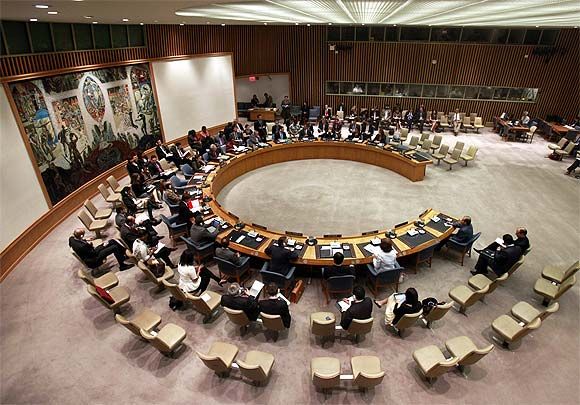 | « Back to article | Print this article |
India's assistance to other nations does not create indebtedness and is without conditionalities, a top Indian diplomat has said, asserting that the country's cooperation will be guided by the development priorities of its partners.

India's Permanent Representative to the UN, Ambassador T S Tirumurti, reiterated India's commitment to work with developing country partners towards a resilient and sustainable recovery from COVID-19.
"In India's development cooperation, we will be guided by our partners' development priorities. Our assistance does not create indebtedness and is without conditionalities," he said at the 44th Annual Meeting of the G-77 Foreign Ministers on Thursday, in a veiled reference to China's loans which has led to debt-traps in some countries.
In an indirect reference to China's ambitious Belt and Road Initiative, Foreign Secretary Harsh Vardhan Shringla early this month warned against a global order that gave in to "skewed" arrangements without due consideration for "reliable, secure and sustainable" supply chains.
During a speech at the policy exchange think tank in London, Shringla stressed on India's commitment to promote and contribute to infrastructure, connectivity, economic projects and supply chains in the region by always prioritising the needs of the host community.
Tirumurti said the COVID-19 pandemic threatened to setback decades of progress made by developing countries and push millions back into poverty.
"As G-77 countries, we cannot let this happen. We need to raise our collective voice for recovery, resilience and reform to ensure that we go back to the path of development," he said at the forum titled 'Global response to the COVID-19 pandemic and the obstacles it poses to the implementation of the 2030 Agenda and achievement of the SDGs'.
Tirumurti reiterated India's steadfast commitment to work with its partners from the global South in the G-77 "towards a resilient and sustainable recovery from the COVID-19 pandemic and to build back better and stronger."
Giving the statement for External Affairs Minister S Jaishankar, Tirumurti emphasised that India's approach will be human-centric, based on principles of mutual respect and national ownership with a commitment to sustainable development for all, in the spirit of 'world is one family'.
Underscoring the need for affordable health systems and resilient supply chains to fight the pandemic, he said, India is assisting in urgent health and medical supplies to more than 150 countries.
India has pledged $15 million for GAVI, the Vaccine Alliance, and operationalised the COVID-19 Emergency Fund for India's neighbours with an initial contribution of $10 million.
Prime Minister Narendra Modi has pledged that India, as the largest vaccine producing country, will make its production and delivery capacity available to the entire humanity, Tirumurti said.
He noted that as the 75th anniversary of the United Nations is commemorated this year, the pandemic has laid bare the "shortcomings" of the world organisation and other multilateral institutions. "The call for reformed multilateralism, including reform of the UN Security Council, has only become stronger than ever before," he said.
Tirumurti said that in its South-South cooperation, New Delhi has never let geography limit its approach to assist the developing world. The India-CARICOM Leaders Meeting, India-Pacific Islands Summit, India-ASEAN Summits and India-Africa Forum Summits have further strengthened the special bonding between India and fellow developing countries, he said, adding that India's own embrace of the digital revolution will be a model for the developing world in the global response to COVID-19.
India's concessional Lines of Credit of over $30 billion, its grants-in-aid projects and flagship training and capacity building project under Indian Technical and Economic Cooperation have made a huge contribution to fellow developing countries.
Further, the $150 million India-UN Development Partnership Fund continues to support transformational sustainable development projects with a focus on LDCs, LLDCs and SIDS.
Tirumurti underlined that the 2030 Agenda for Sustainable Development, the Paris Agreement and Financing for Development framework should lay the foundations for global efforts. "We need to impress on our developed country partners to do more and show the necessary urgency.
The COVID-19 pandemic cannot be used as an excuse to not fulfil their commitments or to undermine environmental conventions. India called on developed country partners to undertake activities to strengthen 'Convention-Plus' actions and not do 'Convention-Minus'.
He said 'Convention-Plus' examples include the International Solar Alliance spearheaded by Modi where India has pledged $1.7 billion for solar energy projects, and the Coalition for Disaster Resilient Infrastructure.